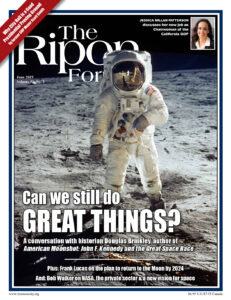Latest Ripon Forum Focuses on 50th Anniversary of Moon Landing & the Future of the U.S. Space Program
 WASHINGTON, DC – With the 50th anniversary of the Apollo 11 Moon landing just around the corner, the latest edition of The Ripon Forum focuses on the future of the U.S. space program and whether – in this age of national debt and political dysfunction – America can still do great things.
WASHINGTON, DC – With the 50th anniversary of the Apollo 11 Moon landing just around the corner, the latest edition of The Ripon Forum focuses on the future of the U.S. space program and whether – in this age of national debt and political dysfunction – America can still do great things.
“Americans still do great things,” states historian Douglas Brinkley in an interview for this latest edition of the centrist Republican journal, “but in this current political climate, particularly with the 2020 presidential election looming, it’s going to be hard to galvanize public support behind one grand endeavor.”
Brinkley is the author of the recent book, “American Moonshot: John F. Kennedy and the Great Space Race.” In a conversation with the Forum, he discusses not only the race to the Moon in the 1960s, but the future of American space exploration today. “I do think there is a national hungering for another Apollo 11-like endeavor,” he observed. “But it will take presidential leadership to pick what that is.
“Barack Obama focused on the Affordable Health Care Act and ate up a lot of oxygen. Donald Trump wants a wall between the Mexico and the U.S. Both of these are very divisive. The Moonshot didn’t have that kind of divisiveness, because once Alan Shepard went into space, everybody was begging for more. And you know, America is fueled by optimism … and if we pull our collective self together, we can do great things.”
In addition to the conversation with Brinkley, this edition of the Forum also features essays by some of the leading experts on space policy today, including:
• U.S. Rep. Frank Lucas (OK-3), who serves as the Ranking Member of the Science, Space & Technology Committee, writing about the plan to return to the Moon by 2024 and how it will set the stage for a new era of space exploration. “Going back to the Moon isn’t a symbolic effort,” Lucas writes. “We need an American presence there to keep us at the forefront of technological development, to identify and manage lunar resources, and to power our missions to Mars.”
• Longtime space advocate Bob Walker, who chaired the Science Committee in the 1990s and writes about the changing role of NASA, the growing role of the private sector, and the new vision of space in the United States. “NASA must restructure itself as a developer of new space technologies,” Walker writes, “but it must do so in conjunction with the entrepreneurial space businesses. It can no longer be the only doorway you walk through on your way to orbit.”
• Retired Air Force General Dave Deptula of the Mitchell Institute for Aerospace Studies, who examines the proposal to establish a new Space Command and the future militarization of space. “Space-based systems are now fundamental to the conduct of war,” Deptula writes, “and the U.S. military cannot fight effectively without them.”
In addition to these essays, Forum Editor Lou Zickar pens an op-ed about Dwight D. Eisenhower’s largely unheralded role in starting the modern space program. Forum Deputy Editor Kyle Chance explores how Millennials view space exploration today. Former NASA Flight Controller Marianne Dyson shares her thoughts on the top 10 ways space exploration has benefited the American people. And Ross Marchand of the Taxpayers Protection Alliance reminds us that America’s lofty aspirations to return to the Moon also carry a lofty price tag – one, he argues, we cannot afford.
In another essay for this latest edition, Scott Smith – a Republican who served six years as the Mayor of Mesa, Arizona and also served as head of the U.S. Conference of Mayors – explains why he believes City Hall is a good proving ground for the White House at a time when six current and former Mayors are candidates for President of the United States. With the cost of college going through the roof, John Bailey of the American Enterprise Institute shares his thoughts as to why Income Share Agreements could help prevent students from going into debt. Kevin Kosar of the R Street Institute provides an important update on Congress’ broken contempt power and why Attorney General William Barr is probably in the clear. And in the latest Ripon Profile, Jessica Millan Patterson discusses her new job as Chairwoman of the California Republican Party and the effort she is leading to rebuild that state’s GOP.
The Ripon Forum is published six times a year by The Ripon Society, a public policy organization that was founded in 1962 and takes its name from the town where the Republican Party was born in 1854 – Ripon, Wisconsin. One of the main goals of The Ripon Society is to promote the ideas and principles that have made America great and contributed to the GOP’s success. These ideas include keeping our nation secure, keeping taxes low and having a federal government that is smaller, smarter and more accountable to the people.



